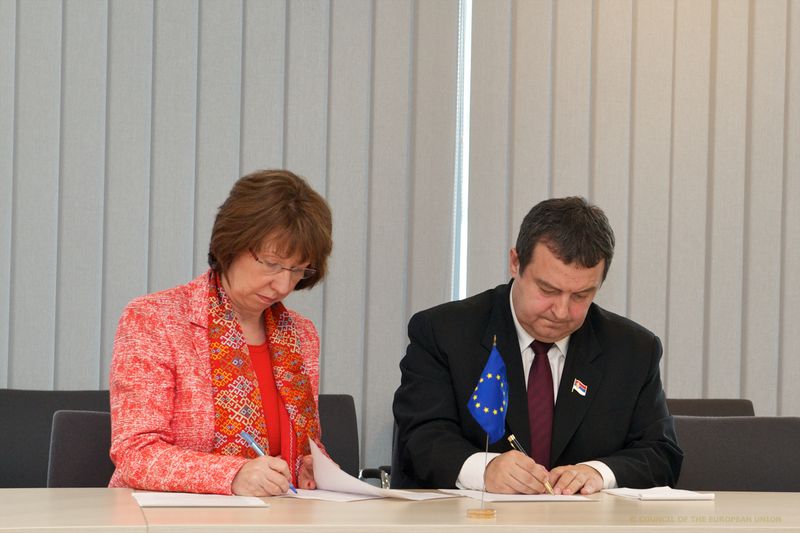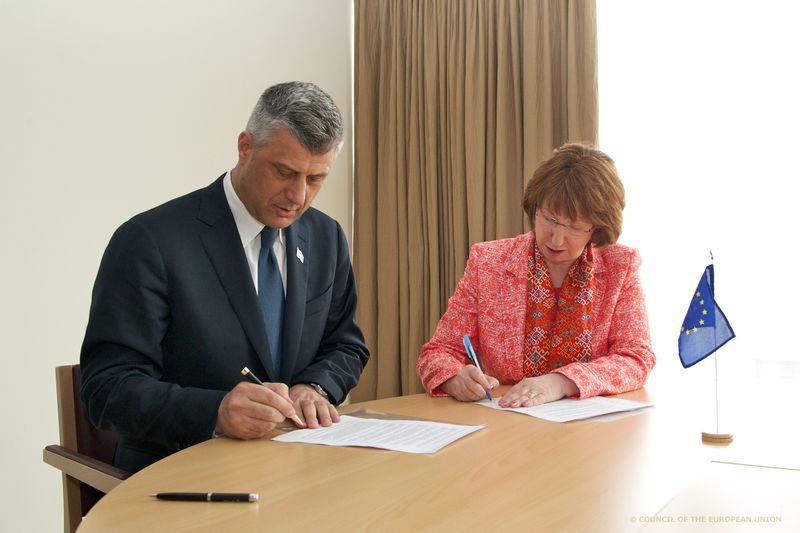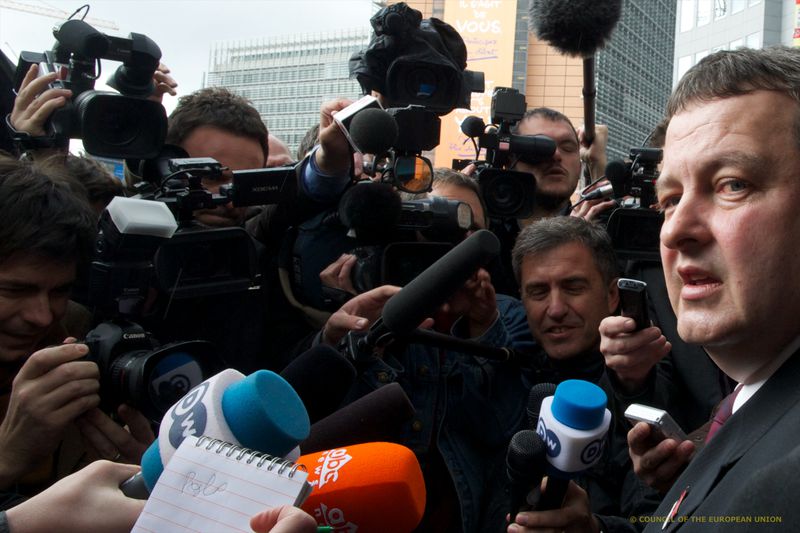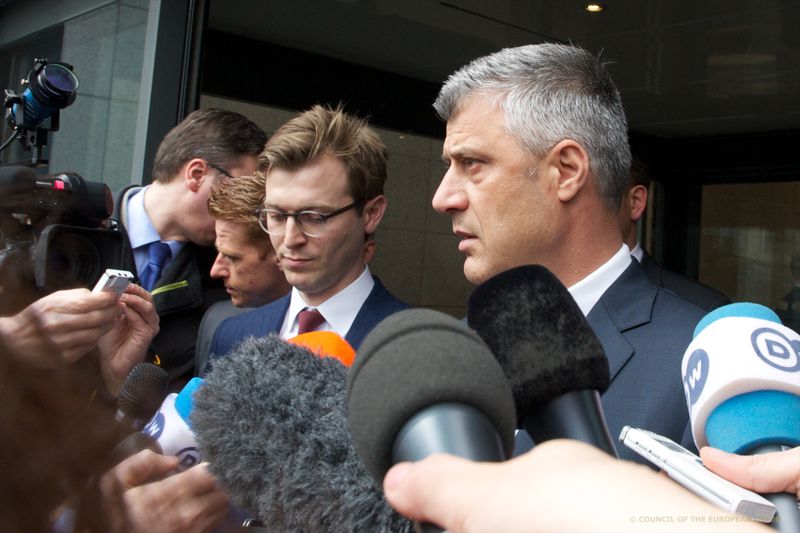The Taming of Serbia
Adelina Marini, April 26, 2013
 "Serbia's progress toward European integration bears huge strategic consequences for the Western Balkans. Simply, without Serbia moving forward onto the next stage, the entire enlargement agenda will be thrown into uncertainty. Not to mention the unfolding of nationalism in Serbia itself", this is what Boris Zala warned, a Member of the European Parliament (S&D, Slovakia), during the debate on Serbia's progress report. The debate in Strasbourg took place before a historic agreement was struck between Serbia and Kosovo for the normalisation of their relations, which Ivan Vejvoda, a Serbian diplomat and a vice president of the German Marshall Fund, called the "Good Friday for the Balkans".
"Serbia's progress toward European integration bears huge strategic consequences for the Western Balkans. Simply, without Serbia moving forward onto the next stage, the entire enlargement agenda will be thrown into uncertainty. Not to mention the unfolding of nationalism in Serbia itself", this is what Boris Zala warned, a Member of the European Parliament (S&D, Slovakia), during the debate on Serbia's progress report. The debate in Strasbourg took place before a historic agreement was struck between Serbia and Kosovo for the normalisation of their relations, which Ivan Vejvoda, a Serbian diplomat and a vice president of the German Marshall Fund, called the "Good Friday for the Balkans".
Serbia has travelled a really long way of practical taming. After the devastating wars that accompanied the break-up of former Yugoslavia in the end of the 20th century, Serbia hardly managed to find its way wandering about between the impossibility to reconcile with its hurt pride, the unabating nationalism, the search of an alternative with Russia and the inevitability of getting closer to the EU. The first big achievement was the articulation of the European integration as a strategic national interest for Serbia. But the difficult part was to implement that, especially after the EU directly said the path toward a full fledged membership passes through normalisation of relations with Kosovo, underlining thickly that this did not mean recognising the independence of the former Serbian province.
EU initiated a dialogue which was facilitated by Baroness Catherine Ashton, the Union's high representative for foreign policy and security. Initially, the dialogue was taking place on a low political level, but as of last year, after the elections in Serbia, the level was raised to an extent that in the beginning of this year even the presidents of Serbia and Kosovo - Tomislav Nikolic and Atifete Jahjaga sat together at the negotiating table. In December, the leaders of the EU member states said clearly during their summit that Serbia would see a date when it agrees with Kosovo, and the time horizon was June 2013. Things are never easy with Serbia. It was not easy this time too. When the negotiations seemed to be nearing the end and the agreement was hammered out, Belgrade pulled back - the price was too high. The government had several days to consider and decide. And it decided - no. The EU said they were only a facilitator.
Right at the moment when the Commission was expected to publish its final report (on Wednesday last week) which the foreign affairs ministers to review at their General Affairs Council on April 22nd, readiness was demonstrated for another round of negotiations, which ended successfully last Friday. The first deputy prime minister of Serbia, Alexander Vucic, said in an interview with the Serbian national TV after the deal was struck that this was the best that could be agreed. "Formally and legally we got more than we have ever gotten", he said. Vucic called on the member states to fulfil their promises and ensure investments in Serbia.
The agreement
As euinside wrote, the main problem was with some of the points in the agreement, especially in its part about self-governance of the Serb municipalities in Kosovo. The key points are 9 and 14. In point nine, it is pointed out that the four northern municipalities (Northern Mitrovica, Zvecan, Zubin Patok, Leposavic) will have a regional police commander. He will be a Kosovo Serb appointed by the Ministry of the Interior and chosen from a list presented by the four mayors on behalf of the association of Serb municipalities. A separate commander will be appointed for the municipalities in Southern Mitrovica, Skenderaj and Vushtrii.
And the fourteenth point represents a commitment by the two sides not to hamper each other's or to encourage others to hamper their progress toward the EU. The other points in the agreement remain generally the same as before, the essence of which is that local elections will take place in the northern municipalities yet this year with the assistance of the OSCE and within the Kosovo legal framework. A panel will be established in the Appellate Court in Pristina which will consist mainly of Kosovo Serb  judges who will deal with all the municipalities where the Serbs are a majority. There will also be a permanent division of the Appellate Court in Northern Mitrovica which will consist of administrative officers and judges.
judges who will deal with all the municipalities where the Serbs are a majority. There will also be a permanent division of the Appellate Court in Northern Mitrovica which will consist of administrative officers and judges.
The association of Serbian municipalities will have a representative role in the central authorities of Kosovo and will have a seat in the municipal consultative council. The police force will be only one and will be called Kosovo Police. All police forces in northern Kosovo will be integrated within the Kosovo police and the wages will be paid by the Kosovo budget. The members of the Serbian security forces will be offered to join the corresponding Kosovo structures. Both sides have agreed also to create a commission for the implementation, again with the facilitation of the EU. Work has already began.
The agreement was met with delight by the member states and the EU institutions, and Twitter literally started boiling in the late afternoon on Friday. The congratulating party joined even Michel Barnier, the EU internal market commissioner. In Serbia, however, the nationalists reacted violently and attacked the government for "betraying" Serbian interests and that it gave up on Kosovo. And Kosovo itself announced that with this agreement Serbia practically recognised the former Serbian province. There were protests in northern Kosovo and Serbian Prime Minister Ivica Dacic was attacked by furious citizens. In his Sunday interview for the national TV RTS, Alexander Vucic firmly rejected all allegations and underscored that Serbia in no way recognised the independence. He hoped with time passions would cool down.
He reassured that Serbia would continue to pay for health care and all the other things, but in a transparent way. "The kids will not study that the national hero is Iskender, but that those are Karadjurdje and Milos, and all the other Serbian heroes", he said. "The Albanian boot will not be in northern Kosovo. We have a guarantee for that. Is this not enough?", Mr Vucic asked in the one-hour almost monologue on national TV.
Serbia is ready to begin negotiations, the Commission says
Right after an agreement was reached, the Commission published the reports on Serbia and Kosovo in which it welcomes the efforts of the two parties. According to the conclusions of the Commission, the prime ministers of the two countries succeeded to create a good working relationship and demonstrated political courage and maturity in discussing the sensitive issues in particular. The document outlines the main elements of the agreement and then moves on to the other areas of monitoring Serbia's progress which the country should handle without delay. In the end, the Commission recommends to the Council to set a date for beginning of negotiations. The country's efforts in many areas are reported as big, including in tough areas like the judiciary, the fight against corruption and media freedom.
It is said that significant changes were made to the Criminal Code and more are to come. The fight with organised crime was a central element of the work of the government ever since its formation, the report says. But still, the country has to establish a track record of effective investigations, prosecutions and convictions of perpetrators of corruption and organised crime. Regarding another very important element of the transition to mature democracy, which proved to be a significant challenge in the region, is media freedom. On this indicator, the Commission sees progress mainly due to the decriminalisation of defamation. Also welcomed is the establishment of a special commission consisting of journalists, police and representatives of the security of information services whose task is to throw light over unresolved killings of journalists.
Some progress is noted in the fight against discrimination, but this means in the Brussels language that rather nothing is done. In general, it is written that the legal framework is in place, but implementation must improve, including by generating favourable environment in society. Progress is noted also in terms of processing cases of discrimination against people with different sexual orientation. Special attention is paid also on the rights of minorities. Those are issues which were thoroughly discussed during the debate in the Europarliament on April 17th. Dutch MEP Marije Cornelissen from the Greens/EFA group expressed specific concern with the presence of aggressive hooligan groups in Serbian society.
She recalled that when the gay pride was cancelled last year, the government practically said that "it had no monopoly on violence in Serbia, that those groups are too strong and too aggressive, that the government cannot control them and that they are a threat to the rule of law". Marije Cornelissen hoped that in October there will be a peaceful pride and a peaceful football championship. Bulgarian MEP from the left Evgeni Kirilov raised the issue about the Bulgarian minority in Serbia. His statement was very well intended and started by commending the country for demonstrating flexibility in the dialogue with Kosovo. "Serbia should not be pushed too hard and we need to demonstrate flexibility to it", he said, but  underscored that still there were problems with the attitude toward the Bulgarian minority and in particular toward the people with two passports. In his words, the problems were mainly on the local level.
underscored that still there were problems with the attitude toward the Bulgarian minority and in particular toward the people with two passports. In his words, the problems were mainly on the local level.
The daughter of Romanian President Traian Basescu - Elena (EPP) - accused the Serbian authorities of trying to create an artificial language and that they created obstacles for the people who wanted to learn their mother tongue. She also raised the issue about the Romanian Orthodox Church not being recognised outside the Balat region. In the Commission report, it is pointed out that the government in Belgrade had called on the Serbian Orthodox Church to launch a dialogue with its Romanian sister church, but for now progress is limited.
The shadow of Bulgaria and Romania was cast over Serbia too
The influential German daily Süddeutsche Zeitung calls not to rush with starting negotiations with Serbia after the conclusion of the agreement with Kosovo. The EU should wait and see how the agreement between Kosovo and Serbia is implemented before proposing to start negotiations with Serbia, the newspaper writes, quoted by the European press portal Eurotopics. "In recent years the EU has found to its dismay that some of the promises of would-be Europeans were worth nothing once they had cashed in on the rewards promised by Brussels in return for their concessions. Romania and Bulgaria have provided a few examples of this", the newspaper writes. The Austrian Die Presse, however, is right on the opposite position and calls: "Don't leave the Balkans to themselves". In spite of the bad experience with Bulgaria and Romania, the daily writes, to give Serbia green light is the right course. Much more logical it is to allow Serbia to join, even if that would take another 10 years, rather than the country and its neighbours are left isolated forever, leading them toward new nationalistic and self-discovery processes.
The forgiveness
The road to Serbia's full integration into the EU goes through painful turning inward which seems to be getting started. While Serbia was deliberating on whether to reject the agreement or not, the government and many analysts said a fateful choice was to be made. Serbia had to decide whether to choose the path of European integration, of economic reforms, benefiting from the single market or to risk and remain isolated from the world. The country has already made its choice, but now it needs to make the next step - apologise. A step in that direction made President Tomislav Nikolic, who in an interview with a Bosnian TV uttered words no one expected him to say. He said he begged forgiveness for all crimes committed in the name of his country and people, He apologised for the crimes committed in Srebrenica - an apology that caused controversy on Twitter whether he really said the key word 'genocide'.
Last year he said the massacre of nearly 8,000 men and little boys in Srebrenica during the Bosnian war could not be called a genocide. In his interview for the Bosnian TV he was pushed to say that it was a genocide. Nikolic said that everything that happened on the territory of former Yugoslavia during the wars bore the characteristics of a genocide. About Srebrenica he dropped the word, but then corrected it with "crime". This happens in a very brief fragment of the interview provided by the Bosnian TV from which it does not become clear whether the remarks were not taken out of a context. Up to the moment of writing this text, the entire interview was not available to see what exactly did he say. Nevertheless, the change is big and progress is visible. But it will not be easy for the government. It is also not clear what will be the attitudes of a possible next government in case of early elections, of which there was word recently in Belgrade. Emine Bozkurt, MEP from The Netherlands (S&D), said during the  debate last week that Serbia had to launch a campaign to change mentality. And that is probably something the EU should try to implement for the first time.
debate last week that Serbia had to launch a campaign to change mentality. And that is probably something the EU should try to implement for the first time.
The time is right because support for Serbia in the EU is indeed huge and the debate in Strasbourg last week was a vivid example. UK MEP Charles Tannock (European Conservatives and Reformists) called for understanding to Serbia. After all, it is hard to imagine that only 14 years ago the Serbs were bombed by NATO and there still was a dictator in power. For understanding appealed Greek MEP Nikolaos Salavrakos (Europe of Freedom and Democracy). Serbia is on a stable European path and implements its promises in spite of the difficult economic and political situation. Serbia is the only country on the European continent where there were military clashes recently and we have to demonstrate our understanding and offer our support, the Greek MEP added.
Nadezhda Neynsky, from the EPP group and former foreign minister of Bulgaria at the time when NATO launched the bombings over Serbia, hoped that the country would overcome its past. And another Bulgarian MEP - Kristian Vigenin (S&D) - said that never before the future of Serbia was in their hands as it was now. The rapporteur on Serbia in the European Parliament, Jelko Kacin (ALDE), recalled, however, that what was important at the moment was to implement the agreements. According to him, the support for the integration process strengthened the pro-reformist forces in the accession countries and brought stability.
The agreement is not simply a success for Baroness Ashton who was heavily criticised that she did not play well her role as provided by the Lisbon Treaty. This agreement is addition to the reasons why the EU got the Nobel Peace Prize last year. But it also obliges the Union really much not to miss the opportunity to provide the necessary assistance to Serbia to overcome the psychological and political difficulties which will accompany the acceptation of realities by the more extreme layers of society. EU should not let itself focusing only on its own economic troubles because the success is huge, but it is fragile.
 Bakir Izetbegovic, Andrej Plenkovic | © Council of the EU
Bakir Izetbegovic, Andrej Plenkovic | © Council of the EU Aleksandar Vucic, Recep Tayyip Erdogan | © Serbian Presidency
Aleksandar Vucic, Recep Tayyip Erdogan | © Serbian Presidency Jean-Claude Juncker, Zoran Zaev | © European Commission
Jean-Claude Juncker, Zoran Zaev | © European Commission